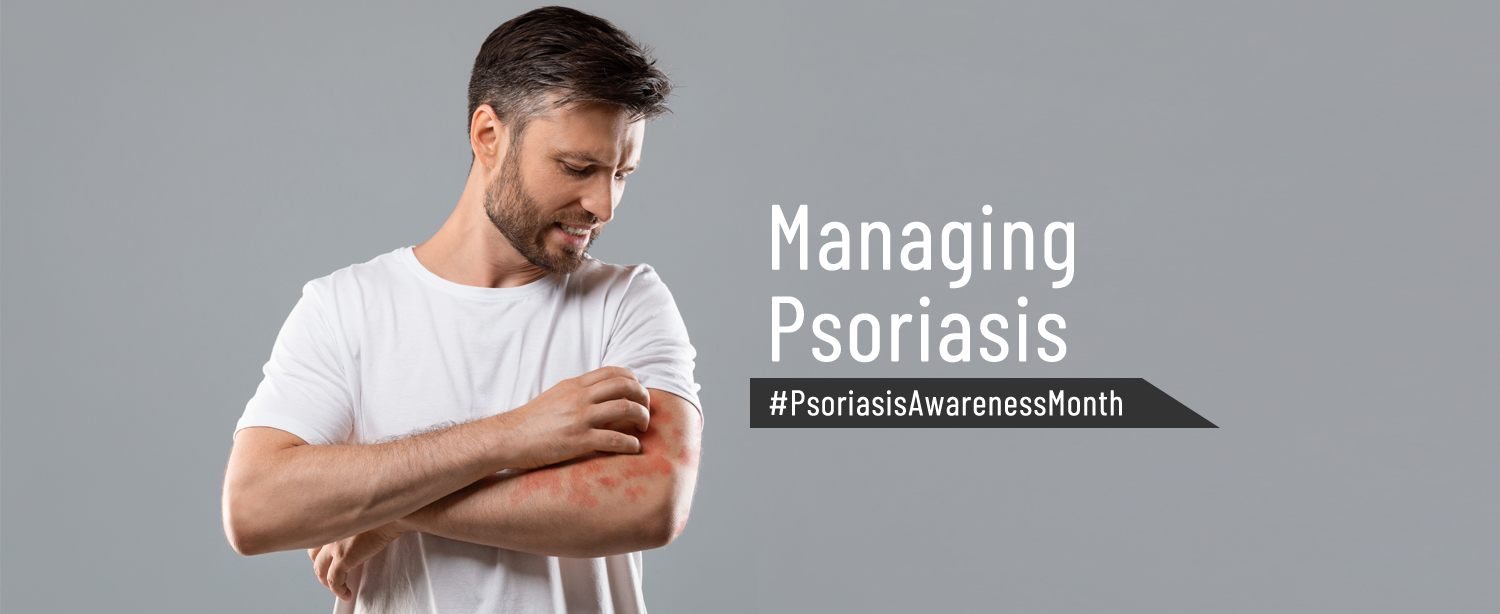Psoriasis is a skin condition in which the skin cells develop up to ten times faster than normal. The skin develops rough red spots covered with white scales as a result of this. Psoriasis is a papulosquamous skin disease with a wide range of appearance, severity, and duration. It affects 0.44 to 2.8 percent of the population in India and 1.5 percent to 3 percent of the population worldwide. Early adulthood is when psoriasis commonly emerges. It affects only a few locations for most people and usually appears on the scalp, elbows, knees, and lower back. However, it can cover vast areas of the body in severe cases. The patches can heal and reappear at any time during a person’s life. Psoriasis significantly impairs the quality of life of patients and their families resulting in immense physical, emotional, and social burden
Symptoms of Psoriasis
The symptoms of psoriasis vary depending on the type of psoriasis you have. Some common symptoms for “plaque” psoriasis, the most common form of psoriasis include:
- Plaques of red skin, often covered with silver-coloured scales.
- Itchy and painful scales.
- Dry or cracked skin that bleeds.
- Pitted or thickened fingernails or toenails.
- Swollen joints.
Triggers of Psoriasis
Psoriasis is more likely to develop if you have a family history of it, have an overactive immune system, or are obese. According to research, at least 10% of people inherit genes that can cause psoriasis, although only 3% to 5% of those who inherit these genes develop the condition. Psoriasis symptoms can be influenced by a variety of situations known as triggers. These include:
- Stress
Stress is a major trigger for some people with psoriasis, either causing psoriasis to flare up for the first time or to make it worse after you’ve been diagnosed.
- Cold weather
The cold, dry conditions of winter can aggravate psoriasis, but warm, sunny settings can aid. It’s crucial to keep your skin moisturized throughout the day. In addition, using a humidifier in your house can help.
- Dry skin
Anything that injures the skin can cause a psoriasis flare, including excessively dry skin or allergies. Keep your skin moisturized.
- Upper respiratory infections
Colds and other infections, especially strep throat, activate the immune system and can cause psoriasis to flare. If you have psoriasis and develop a sore throat, speak to your doctor for further assistance.
- Smoking and Alcohol
Cigarette smoke can make the symptoms of psoriasis worse. Smokers have almost double the risk of developing psoriasis compared with people who’ve never smoked. Heavy drinking is also known to trigger psoriasis flares.
- Medications
Some medicines used to treat high blood pressure, heart disease, arthritis and mental disorders can trigger psoriasis.
Psoriasis Facts
- It’s not contagious.
- Psoriasis triggers vary from person to person.
- There are five types of psoriasis including – plaque, guttate, inverse, pustular, erythrodermic.
- Psoriasis can affect more of your body than your skin.
Tips to Manage Psoriasis
While medication can reduce (or clear) psoriasis, anything that irritates your skin can cause psoriasis to flare — even when you use medication. By finding your triggers and learning how to manage them, you can gain better control of your psoriasis and have fewer flares. Dermatologists share these tips for caring for psoriasis:
- Try to avoid skin injuries, such as cuts, and bug bites.
- Avoid getting a sunburn.
- Treat your psoriasis on time.
- Try not to scratch as it tends to worsen psoriasis.
- Apply a cold compress.
- Apply medication as directed by your dermatologist to your skin until the psoriasis clears.
- Moisturize daily throughout the day.
Psoriasis Care at Kokilaben Dhirubhai Ambani Hospital
Struggling to manage your psoriasis symptoms? Working closely with a dermatologist, the use of medication, and avoiding your triggers is known to help alleviate the symptoms of this skin condition. Consult our highly trained dermatologists for a detailed diagnosis and treatment plan. Please find below the website link for further information: https://www.kokilabenhospital.com/departments/clinicaldepartments/dermatology.html


